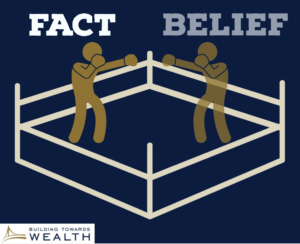Should we buy that stock we hear about on the news? Should we sell that mutual fund that has done well for us in the past? Am I going to be able to reach my goals if I do not do what Bob & Sally told me they were doing with their 401k account? These are all questions that might have crossed your mind at some point. The questions that we need to ask ourselves is “Are we operating with cognitive biases in our investment process?” and “Will those biases keep us from making the right decisions?”. We are going to look at this in this week’s Inside Look at Building Towards Wealth.
A cognitive bias is a flaw in your reasoning that leads you to misinterpret information from the world around you and to come to an inaccurate conclusion. Because you are flooded with information from millions of sources throughout the day, your brain develops ranking systems to decide which information deserves your attention and which information is important enough to store in memory.
It also creates shortcuts meant to cut down on the time it takes for you to process information. The problem is that the shortcuts and ranking systems are not always perfectly objective because their architecture is adapted to your life experiences.
The best we can do is to manage our own biases, we cannot eliminate them. That is why it is important to surround yourself with good people who can help you realize the biases you may be operating under.
We will examine a few of the most prevalent biases and how they could affect your investment process and could hamper your returns.
Recency Bias– Recency bias is a cognitive bias that favors recent events over historic ones. A memory bias, recency bias gives greater importance to the most recent event such as the previous weeks returns of a stock.
How this could affect your investment process: You see a stock being talked about on CNBC and you hear about how it is up 50% in the last month. You decide to buy it disregarding the fact that it has been down 50% over the previous year with poor future financial prospects.
How you can try to overcome this bias: Make sure you understand not just the recent returns of an investment but it is long-term performance as well as future prospects to continue producing recent returns.
Outcome Bias– The outcome bias is an error made in evaluating the quality of a decision when the outcome of that decision is already known and without regard to how that outcome happened.
How this could affect your investment process: You decide to make an investment in real estate after learning that a friend made a big return on their own real estate investment. You do not look at other factors that contributed to their success like the performance of real estate at the time of their investment or the overall state of the economy.
How you can try to overcome this bias: Make sure you understand all the factors that made an investment profitable for someone not just the outcome. Anybody could make money in the short-term using a bad process. It is likely that a bad process will catch up with over time.
Confirmation Bias: The tendency to interpret new evidence as confirmation of one’s existing beliefs or theory, confirmation bias is a huge source of investor overconfidence. You have seen people who are always bullish or always bearish, like I wrote about here , despite what is actually happening in the markets, and confirmation bias is a large source of that.
How this could affect your investment process: You bought XYZ mutual fund because you believed that the area it invests in will go up. Now, the outlook for the sector is not looking as good and the general economic conditions have changed. Despite this you search out stories that confirm your previously held beliefs about the funds.
How you can try to overcome this bias: Social media makes it easy to tune out contrary opinions, but the best way to avoid confirmation bias is to seek out contrary opinions. Also avoid searching out only confirming information. Ask “What would it look like if I was wrong?”
Hindsight Bias: Hindsight bias is a psychological phenomenon that allows people to convince themselves after an event that they had accurately predicted it before it happened. This can lead people to conclude that they can accurately predict other events.
How this could affect your investment process: You remember that you thought electric cars will be useful one day and that Elon Musk was a smart guy. You should have bought Tesla stock because you knew it would increase in value. You can see the future and you will now invest heavily in XYZ corporation because they are obviously the future.
How you can try to overcome this bias: Understand that our memories are not wired to remember the million other ideas that we thought could happen that never did. If it was easy to pick the next Amazon, we would all just do that. If a financial bubble was easy to spot as it occurred we would likely avoid it altogether. Understand that hindsight is always 20/20 and that we are not as prescient as we would like to think.
Herd Mentality: is a phenomenon where people follow what they perceive other people are doing. In investing this means investing in what you perceive others are investing in rather than relying on your own analysis.
How this could affect your investment process: You have a sound financial strategy for your risk tolerance and investment timeline. You also notice that a sector, like technology stocks in the late 90’s, is rising rapidly and you change your asset allocation because you don’t want to miss out on what everyone else is doing.
How you can try to overcome this bias: Be sure to have a process in place that leads your investing that does not include investing based on what sector is being talked about most on the news or social media.
Biases are a tricky topic. Nobody wants to believe they are subject to them, but we cannot help how our brains are wired. We can stick our head in the sand and ignore them, or we can do our best to understand and work with and around those biases. Be sure to surround yourself with good people to bounce decisions off or have a strong system in place. You can also work with a professional, a financial advisor will take the time to understand your individual needs and create an investment strategy that is tailored to your specific goals, your individual situation and your risk tolerance.
If you want to dig deeper on the topic of cognitive bias a few of my favorite books on this topic are.
- Thinking Fast and Slow by Daniel Kahneman
- Predictably Irrational by Daniel Ariely
- Factfulness by Hans Rosling


